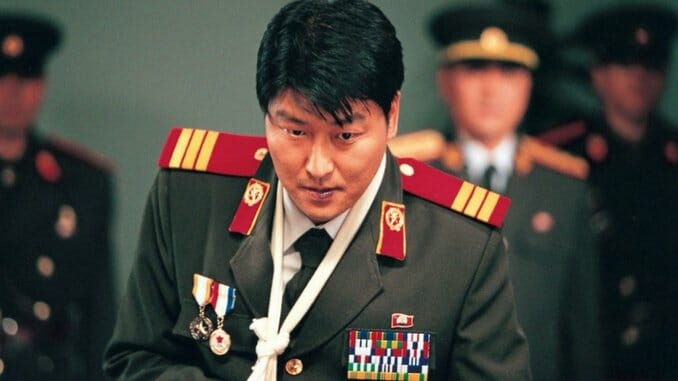Before There Was Vengeance, There Was Joint Security Area

“There are two kinds of people in this world: Commie bastards, and the Commie bastards’ enemies. Neutral has no place here. You have to choose sides.”
Park Chan-wook films are anything but neutral, so General Pyo (Ki Joo-Bong) writes a bad check with his parting shot to Sophie Jean (Lee Yeong-ae), a Major in the Neutral Nations Supervisory Commission. Pyo’s pulling rank on Jean, condescending to her the way macho nationalist xenophobes tend to when anyone wanders into their orbit with an outsider’s perspective: Nuance is anathema to men like Pyo, but it’s a feature, not a bug, for members of neutral nations that didn’t participate in the Korean War, so if Jean takes offense or feels threatened by his attempts at intimidation, she doesn’t let it show.
Nuance is a feature of Park’s work, too, which by now most people likely associate with the righting of wrongs done at the business end of hammers, knives, ornately decorated custom pistols, and mercury-laced cigarettes. Vengeance is Park’s brand. His popularity in the U.S. almost assuredly stems from the same-named trilogy of films he made starting with 2002’s Sympathy for Mr. Vengeance, continuing with 2003’s Oldboy, and concluding with 2005’s Sympathy for Lady Vengeance: They’re slick, richly made movies fixated on a topic that’s arguably more beloved in America than anywhere else on the planet—we here in the States do love comeuppance served with generous helping of red meat—sourced from a cinema that, at the time, wasn’t part of our specific international film lexicon. The series’ appeal to U.S. movie buffs was immediate.
But Park’s popularity at home in South Korea is the singular responsibility of Joint Security Area, his first commercial and critical success following two duds, his debut feature The Moon is … the Sun’s Dream and his sophomore effort, Trio. Imagine starting out your career as a movie director by flopping not once, but twice. Imagine flopping so badly that your alternative for supporting yourself is working as a film critic. If there’s a stronger definition for “commercial failure,” then nobody’s commercially failed hard enough yet to find it. When Joint Security Area opened in South Korea to a box office outpacing the box office of Shiri, at the time the most watched movie in the country’s history, Park’s fortunes immediately reversed, and he took his clout and ran with it right into Sympathy for Mr. Vengeance. From there, his filmography is well-established, and Joint Security Area mere history.
The film’s place in Park’s cinema is essential, though, despite the lack of consideration given it more than two decades after its release: Obvious surface-level discrepancies between it and his future projects aside, Joint Security Area lays the groundwork for Park’s interests, obsessions and aesthetics, wrapped up in a more straightforwardly tragic package. If the Vengeance trilogy—Oldboy in particular—play like Greek tragedies, Joint Security Area plays like a down-to-earth human tragedy outside the realm of divine providence. That’s the effect of the film’s setting and history. Telling a story of men stationed on opposite sides of the DMZ naturally grounds the plot in reality and Korean history, which is painful in ways Park’s subsequent hits simply cannot aspire to be.
-

-

-

-

-

-

-

-

-

-

-

-

-

-

-

-

-

-

-

-

-

-

-

-

-

-

-

-

-

-

-

-

-

-

-

-

-

-

-

-








































